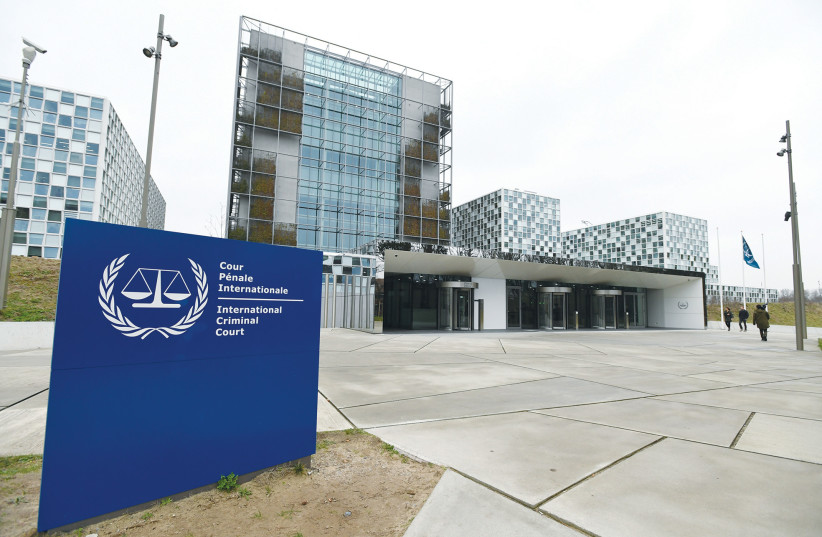On Thursday, International Criminal Court Chief Prosecutor Karim Khan threw a bombshell into the Israeli-Palestinian conflict. In an unusual interview with Reuters, he let Israel and Hamas know that any actions they are currently taking that violate the laws of war would likely be added to his charge sheet of alleged war crimes.
What was most surprising, though, was the way in which he made his threat.
The ICC opened a preliminary review of alleged war crimes in the Israeli-Palestinian conflict in 2015 and a full criminal probe in early 2021. But in the more than two years that Khan has been prosecutor (his predecessor, Fatou Bensouda, took all the prior decisions on Israel and the Palestinians), his silence has been deafening.
The most he has done was last December, when he made a generic statement that he hoped to visit “Palestine” by the end of 2023.
Before the current war, the overwhelming opinion of top Israeli jurists was that Kahn was much less interested in the Israel-Palestine issue than Bensouda had been, or that he would not wade into the conflict until much later into his nine-year term.

The law applies to Israel and Hamas equally
So, the fact that he would remind the world that his and the ICC’s view is that it “has jurisdiction over potential war crimes carried out by Hamas militants in Israel and Israelis in the Gaza Strip, even though Israel is not a member state” of the ICC’s Rome Statute, would not seem to make waves.
The parts of the interview that showed Khan being more threatening to Israel than he had been until now were the words “even though Israel is not a member state” and “yes, we have jurisdiction wherever they’re committed, including on the territory of Israel,” as well as the quote: “This is what the moment needs, cool leadership, humanity and the realization that the law will judge all of us.”
Instead, Khan could have simply said that the ICC has jurisdiction over everyone, and that would have covered previous ICC rulings.
The fact that he interjected that he has jurisdiction over Israel, though it has not signed the Rome Statute, shows a different level of commitment to the issue.
His statement that “the law will judge us” theoretically applies to both Hamas and Israel, but between the two, it would seem that Israelis would be more worried and more convinced to think twice about a targeting decision because of legal consequences versus Hamas, which systematically targets civilians and uses humans as shields.
Khan then went out of his way to say that the current violence was part of his mandate, rather than just the 2014 Gaza War, which led to the opening of the preliminary probe. It seems that Khan will likely, at some point, wade into the Israeli-Palestinian conflict more seriously and may even visit the region someday, as he said he hoped to do last year.
He is certainly being pushed to do so. Indeed, his Reuters interview came after he received public letters sent to him by pro-Palestinian groups calling for him to take a higher profile on the issue.
The question is why now, and the answer is that the global political context has never been more favorable to Israel and more anti-Hamas.
This quote by Khan said it all: “One cannot deliberately target civilians or civilian objects. One can’t rape or kill, or mutilate or dismember. Willful killing, hostage-taking are grave breaches of the Geneva Convention, and one has to comply with the law.”
Khan’s listing the rape, mutilation, and dismembering of bodies of the Hamas terrorists let Hamas-associated groups know that they would not be able to use artificial distinctions to escape justice.
According to the Rome Statute, Khan must remain neutral between Israel and the Palestinians. Yet, with the videos of Hamas’s attrocities spreading across the planet, sounding too neutral in tone could be politically dangerous for Khan.
He likely toned down his entire warning toward Israel both to manage expectations about how soon he will be acting, as well as not to sound like he had his head in the sand and does not realize the difference between Hamas and the Jewish state.
Whether Hamas’s heinous crimes and the IDF’s system for self-prosecution of alleged war crimes will be enough to ultimately protect Israelis from Khan regarding indictments for war crimes is still anybody’s guess. Israel’s recent internal judicial overhaul debate could also impact that issue.
The upcoming Israeli invasion will probably make ICC involvement more likely, no matter how hard Israel tries to avoid civilian casualties on the Palestinian side.
